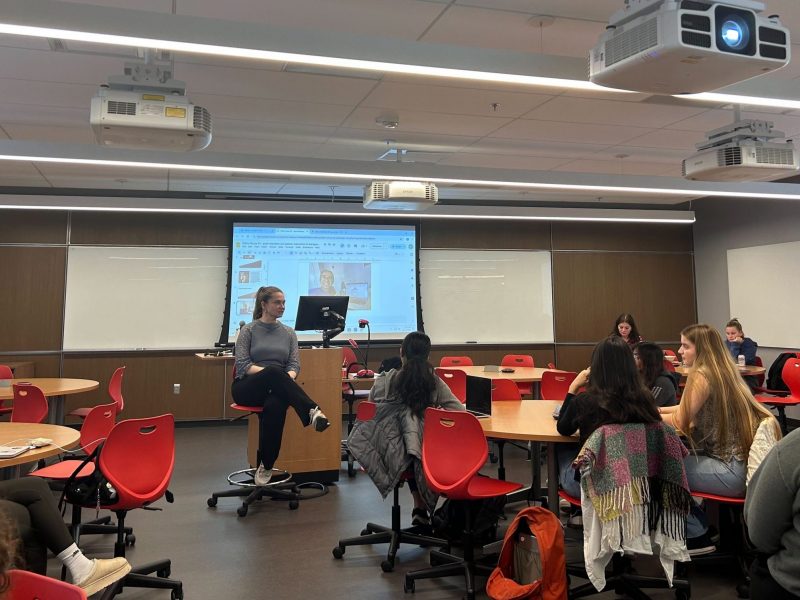
Natalia Cuadra-Saez is running for the SGA presidency on the STARE ticket
For Natalia Cuadra-Saez, a hyphen connects so much more than her last names: She’s a Puerto Rican-Chilean-American, a Latino-LGBT-Native American rights activist, a Spanish-and-English speaker, a church-going history lover and a wild-card candidate in the upcoming election. And that’s not all.
A junior classics and history major, Cuadra-Saez said if elected she will bring a new and stronger voice to the Student Government Association, amplify diversity across the university and empower students to get involved.
The only female candidate in the race is no stranger to the organization. In her one year as the SGA’s North Hill legislator, Cuadra-Saez sponsored or co-sponsored 12 bills. They include resolutions supporting the creation of more Native American courses, opposing furloughs for employees with salaries under $30,000, advocating the full reinstatement of Associate Provost for Equity and Diversity Cordell Black and funding the first-ever SGA-sponsored Housekeeper Appreciation Day last week — a free lunch for about 100 residence hall housekeepers, where students served and mingled with employees and sent “thank you” cards to express their gratitude.
Although many of Cuadra-Saez’s proposals have been met with success within the governing body, many of the changes they recommend the university make are unlikely to come to fruition.
But Cuadra-Saez said her party, the STARE ticket — Students Taking Action to Reclaim our Education — represents tangible goals and student empowerment. One of her goals is to make the SGA more accessible and encourage students to participate in the organization that she admits can be overly confusing.
“[The SGA’s] main role is to advocate for students and how can you accomplish that if you’re so unapproachable because of your language, your structure,” she said. “We need to build on what we do have that’s good … you always have to start there. Then look at the big problems and change those things.”
In addition to making the SGA more student-friendly, she Cuadra-Saez wants to bring diversity front and center and bring co-op housing options to the university.
The co-op properties would be owned and maintained by the students who rent them, driving down prices and eliminating landlord-tenant spats. Students would work together and learn how to share responsibility in the house’s upkeep, she said, noting the project would ideally start with one property and quickly expand.
“A lot of our peer institutions have had co-op housing for decades,” Cuadra-Saez said. “Housing is a big issue here — especially if you’re looking for housing in a community. The new ones popping up, like Commons, are less and less community-feeling. They’re not community-oriented and people aren’t knowing their neighbors, so we need an alternative.”
In response to the administration’s plans to cut Native American studies courses, Cuadra-Saez proposed a bill earlier this month demanding the university continue to offer them. She said her alternative spring break trip to a South Dakota reservation last year opened her eyes to the plight of Native Americans, and she is determined to see the initiative through at the university level, even if the SGA votes down her resolution tomorrow.
American Indian Student Union President Erin DeRiso, a senior government and politics and journalism major, said Cuadra-Saez was “absolutely a backbone” in launching the first-ever American Indian Solidarity Week last semester during American Indian Heritage Month.
“The thing about Natalia is she’s very passionate about everything she does,” DeRiso said. “She has a million things going on at once, but she has the ability to multitask with more efficiency than anyone I’ve ever met. She wears many hats, so she has connections all over the place, which was really helpful to us.”
Besides her memberships in an array of student groups — Students for Justice in Palestine, the Latino Student Union, Pride Alliance, AISU, Chamber Singers and the all-female a capella group Femmes de Chanson — Cuadra-Saez heralds her ability to relate to a wide range of people as key for any SGA president.
“I dabble in a lot of things,” Cuadra-Saez said. “It made me think the president would be a good idea, because I already know so many different aspects of campus. I’m not a one-issue kind of person.”
But just going to a lot of meetings isn’t enough, she said; a leader needs to follow through. She thinks she can do so, and that is what she hopes will differentiate her from incumbent SGA President Steve Glickman and SGA Vice President of Finance Andrew Steinberg, the presidential candidates of Your Party and SKYY Party, respectively, in next week’s elections.
“I can’t leave the issues I get involved with,” she said. “If I became president, that would throw me into this position of feeling like it is my responsibility to be constantly advocating for students. That would become my new obsession.”
gulin@umdbk.com


